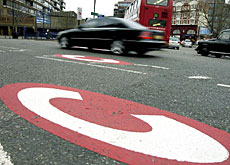
London’s example drives debate over road charges

The success of London’s “congestion charge” has revived debate in Switzerland about introducing similar measures in Swiss cities.
Experts have proposed limited trials of a toll system as a way of reducing traffic congestion in Swiss cities.
The introduction of a congestion charge in the English capital one year ago has reduced road traffic in London’s inner city by 30 per cent and brought in revenue of £68 million (SFr155 million).
This success has led to discussions about introducing a similar system in Switzerland, although the introduction of a toll system across the country is not possible under the Swiss constitution.
Wider debate
“Road charging is a way of making drivers pay for uncovered environmental costs,” said Adrian Schmid of the non-governmental Transport and Environment Association.
“We have to consider where to hold trials, whether in a bigger city like Zurich or Geneva or a smaller city such as Lucerne,” Schmid told swissinfo.
Another open question is the funding of such trials, Schmid said. But it is clear to him that such projects would have to be evaluated scientifically and politically.
“I’d like to see a wider public debate on the issue,” Schmid said. “Road charges should not been as the only way to tackle traffic congestion in cities and urban areas,” he pointed out.
Markus Liechti, a project manager with the European Federation of Transport and Environment also advocates a pragmatic approach.
Constitutional ban
“It is not realistic to press for changes to the constitution and lift a ban on road tolls for Swiss roads,” Liechti said.
Liechti is convinced that the best way forward is to introduce road charges on a trial basis as positive results would make it easier to call for amendments to the constitution.
For their part, Swiss city authorities do not object to trials, but they have ruled out discussion on the introduction of road charges on a nationwide level.
“As things stand now road charging is not a suitable method in the medium term to finance traffic in urban areas,” Urs Geissmann, director of the Swiss City Association said.
Geissmann said the introduction of a toll system would entail an overhaul of the system of taxes on fuel and vehicles and use of Swiss motorways.
No inner cities
Geissmann added that it would be crucial to define the zones in which road charges would apply, and to ensure that motorists could not avoid the charge by using small backstreets.
“Unlike London there are no inner city zones in Switzerland, Swiss cities are formed by larger urban sprawls,” Geissmann said.
The country’s leading motorist association, Touring Club Switzerland, has dismissed road charges as unjust and illegal.
“If we followed London’s example, motorists would have to pay an additional SFr3,000 ($2,404) annually to drive into the cities,” the Touring Club said in a policy paper.
Public hearings
In the past, the Swiss parliament has repeatedly voted down proposals for a nationwide toll system.
Despite that, the Swiss Centre for Technology Assessment is organising a series of public hearings on the issue for August and September.
The government advisory body has invited experts and members of the public to discuss different aspects of road charging in Switzerland.
These include the question of why motorists are willing to pay a parking fee, but not a charge for the use of certain roads.
swissinfo, Renat Künzi (translation: Urs Geiser)
Singapore, Bergen (Norway) and London (Britain) have already introduced congestion charges.
The Swedish capital, Stockholm, is set to follow suit in 2005.
Plans are also underway for the introduction of tolls in Paris, Berlin, Milan and Barcelona, as well as in four British cities – Manchester, Edinburgh, Cardiff and Bristol.
Following the success of the congestion charge in London, a debate is underway in Switzerland on introducing road charges on a trial basis.
Last year parliament rejected a proposal to introduce tolls on a nationwide level.
Since the introduction of the congestion charge in 2003, London has experienced a 30% decrease in traffic.

In compliance with the JTI standards
More: SWI swissinfo.ch certified by the Journalism Trust Initiative






























You can find an overview of ongoing debates with our journalists here . Please join us!
If you want to start a conversation about a topic raised in this article or want to report factual errors, email us at english@swissinfo.ch.